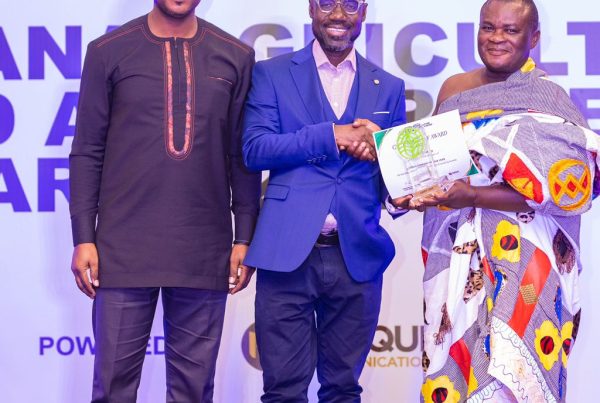Livelihoods in the Northern part of Ghana are characterized by chronic poverty, food insecurity and environmental degradation which continue to worsen due to the region’s vulnerability to climate change. Considering this need, the CGIAR Research Program on Climate Change, Agriculture and Food Security (CCAFS) is using its Climate-Smart Village (CSV) models in West Africa Ghana to test and validate several agricultural interventions with the participation of various local partners. In 2014 and 2015, CCAFS-West Africa signed an agreement with Esoko Ghana and the Ghana Metrological service to provide climate information to farmers through ICT (mobile phone) in order to improve their capacity to better manage climate related risks and build more resilient livelihoods.
So far, 835 farmers (of which 33% are females) of two pilot communities (Doggoh and Bompari) have been trained on accessing seasonal weather forecast (through the Esoko platform) and using the information for critical farm decisions including choice of crops, when to plant, when to apply fertilizers etc. Apart from daily and seasonal climate forecast, other information including agro-advisories alerts and market price alerts are also provided, assisting farmers in their crop planning and marketing of farm produce.

A training session by extension officers of the Ministry of Food and Agriculture and Esoko (picture by Gordon Nikoi)
Project Evaluation
At the end of the second year, an evaluation survey was conducted by the M&E team of Esoko. The survey collected information on 88 households which had a total of 490 household members averaging a total of 5 persons per household.
About 90% (79) of the household heads reported that they receive weather information from Esoko, primarily on their phones. When asked how they use the information received, 70% stated they used it mainly for planning their farming activities.

Climate Smart Agric Tips
About 78% of the 88 participants confirmed they receive the agric tips. Out of those that receive, 67% of them reported that they receive agric tips at least once to twice a week; 29% receive about 4 to 5 times a week.

In terms of understanding, 58% of the participants said it’s very easy to understand what the messages say, with 29% saying it’s quite easy.
71% of the agric tips recipients call Esoko’s Farmer Helpline on 1900, when they need assistance to understand the messages sent.
Farmer Helpline

The Esoko helpline platform in Accra, Ghana (picture by Samuel Partey)
Approximately 64% of the participants said they call the farmer helpline; half of them call once or twice a week, with 41% calling once a month.
Farmer Recommendation
When asked what information will be required by the respondents to aid their farming activities for the coming farming season, weather information came on top of the request. Commodity prices came in as the second most important information sought after. About 25% of the respondents requested for data on Extension services and availability and prices of input.
Success Story
For the past two years, substantial successes have been achieved in relation to improved crop productivity.
Below, is a testimony of one beneficiary (translated from Dagaari – a local language), which was a common experience among 83% of the farmers:

Mr. Mampong Naaa – a beneficiary of the CCAFS climate information service program with Esoko. (Picture by Gordon Nikoi)
“My name is Mampong Naa and I live in Jirapa Baazu. After receiving agric messages from Esoko through CCAFS, I can say that I am better today than I was two years ago. The yields of my two favourite crops (maize and millet) have increased and now we will have enough food in the house. I was getting only 4 bags of maize but now I have already shelled 6 bags and we are still shelling as you can see. I have never had such a harvest before. I am following all the advice from Esoko and even call them on 1900 and speak Dagaari with them”



